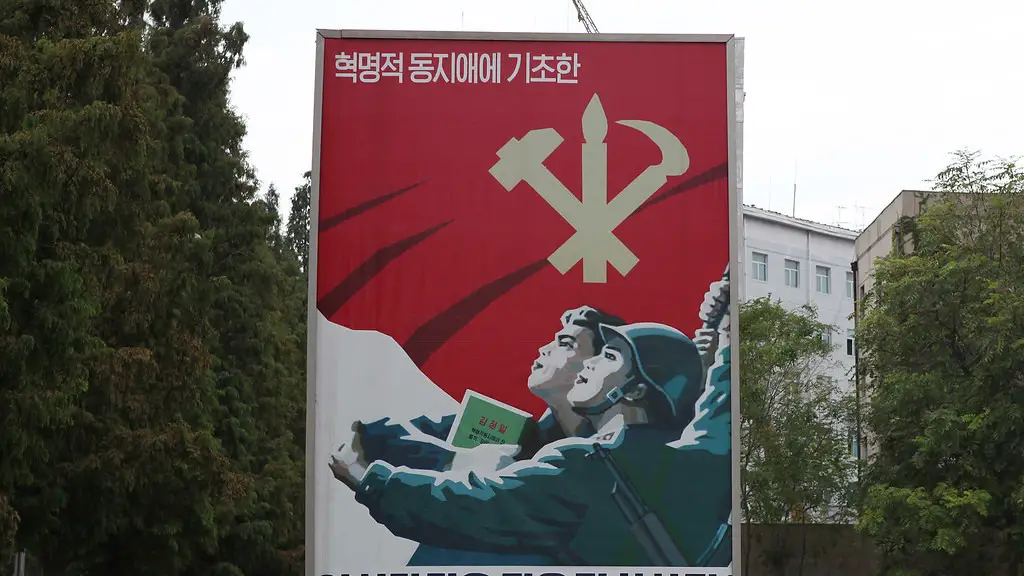In recent months, North Korea has been provocative and defiant in the face of growing international pressure. The North Korea’s development of a nuclear arsenal has become a major concern for its closest neighbours and the rest of the world. The US is one of the most powerful countries in the world and is at the forefront of international efforts to contain North Korea’s nuclear ambitions. The question is, will the US be able to stop North Korea?
The answer to this question is far from straightforward. To begin with, the US has imposed various sanctions on North Korea in a bid to put an end to its nuclear programme. These have had some success, with economic pressure clearly taking its toll on the regime. However, they are unable to completely stop the programme, as North Korea is determined to maintain its nuclear deterrent and has invested heavily in its weapons programme. Additionally, the country has become increasingly isolated from the world and is seen as a “rogue state” by many in the international community.
The US has also been resorting to diplomatic tactics in order to persuade North Korea to abandon its nuclear programme. This has so far been unsuccessful, as North Korea has refused to engage in meaningful dialogue or give up any of its nuclear capabilities. The regime is highly unpredictable and has a history of breaking agreements made with the US and other countries. As such, it is difficult to predict how the US will be able to resolve the situation.
Experts have suggested various options for the US, such as military intervention or working with China and Russia, who have close economic ties with North Korea. However, these options have been met with strong opposition, as they would likely lead to catastrophic consequences. Additionally, the US has recently entered into a historic peace deal with North Korea and has held meetings with the country’s leader, Kim Jong Un. Despite this, there is still no consensus as to how the US will be able to stop North Korea.
Ultimately, the US must tread carefully when dealing with the North Korea issue. With a conflict with North Korea being seen as one of the most potentially devastating in history, the US must use all the tools at its disposal in order to find a peaceful solution. While the US may not be able to completely stop North Korea, it can work to reduce its nuclear capabilities and work towards a peaceful resolution. However, only time will tell if this is possible.
Negotiations
The US has been attempting to negotiate with North Korea in order to put an end to the country’s nuclear ambitions. In 2018, the US and North Korea held a historic meeting in Singapore between President Donald Trump and North Korean leader Kim Jong Un. This was seen as a breakthrough in the diplomatic efforts to end the nuclear standoff, although no concrete agreements were made. Since then, the two countries have been in contact and have had several meetings, including at the border between North and South Korea in April 2019. But so far, these negotiations have failed to achieve any meaningful progress towards ending North Korea’s nuclear programme.
The US has also been trying to engage other countries in the process, such as China and Russia. These countries are considered to have some of the most influence over North Korea and are seen as important in pushing the regime towards nuclear disarmament. China and Russia have both expressed their support for the Singapore Declaration, which outlines a roadmap towards a nuclear-free Korean peninsula. However, they have also been wary of US actions, such as the deployment of US troops in the region and the imposition of sanctions. It remains to be seen if these countries will be able to persuade North Korea to abandon its nuclear programme.
Experts agree that negotiations are the best way forward, as they are seen as the most effective way to peacefully resolve the crisis. However, negotiations between the US and North Korea have become increasingly fraught, with little progress being made in terms of actual disarmament. The US must therefore find a way to engage with North Korea in a meaningful dialogue in order to bring about a lasting peace.
Sanctions
The US and its allies have imposed a number of sanctions on North Korea in an attempt to force the country to abandon its nuclear ambitions. These sanctions are intended to limit the country’s access to financial resources, goods and technology, and have been increasingly stringent in recent years. These sanctions have had some success, with economic pressure clearly taking its toll on the regime. However, they are unable to completely stop the programme, as North Korea is determined to maintain its nuclear deterrent and has invested heavily in its weapons programme.
In addition to economic sanctions, the US has also been using diplomatic pressure to persuade North Korean leaders to end the country’s nuclear programme. This includes offering economic and security incentives to the regime in exchange for a commitment to denuclearisation. However, the US has so far been met with stubborn resistance from North Korean officials, who have refused to engage in meaningful dialogues or give up any of its nuclear capabilities. As such, it remains to be seen if these methods will be successful.
Given the failure of sanctions and diplomatic tactics, some experts have suggested that the US should consider military intervention. This has been met with strong opposition, as it could potentially lead to catastrophic consequences. Additionally, it is unlikely that the US would be able to achieve its aims without the support of China and Russia, who have both opposed military action. As such, it is difficult to predict how the US will be able to stop North Korea.
Alliances
The US has been seeking to build a strong alliance between itself and its allies in order to contain the North Korean nuclear threat. This includes South Korea, Japan and other members of the Six-Party Talks, which include China and Russia. These countries have all expressed their commitment to a nuclear-free Korean peninsula and have urged North Korea to abandon its nuclear programme. However, they have also been wary of US actions, such as the deployment of US troops in the region and the imposition of sanctions.
The US has also engaged in talks with China and Russia, who have close economic ties with North Korea. These countries have expressed their support for a peaceful resolution to the crisis and have offered to help in mediating negotiations between the US and North Korea. However, they have also been wary of US actions, such as the deployment of US troops in the region and the imposition of sanctions. As such, it is difficult to predict how the US will be able to convince North Korea to abandon its nuclear programme.
Ultimately, the US must work with its allies in order to find a peaceful solution to the North Korean nuclear issue. This will require the US and its allies to take a unified stance on the issue and to engage in meaningful dialogue with North Korean officials. However, given the complexity of the situation and the stubbornness of the regime, it is unclear if the US will be able to find a lasting and peaceful solution.
Military Intervention
Military intervention has been suggested as a potential option for the US, as it could potentially bring about a decisive victory for the US in the North Korean nuclear issue. This would involve either a pre-emptive strike or a full-scale invasion of North Korea by the US and its allies, which would likely cause massive destruction and casualties. Such a conflict would be one of the most devastating in history, and the US must tread carefully when considering such an option.
Additionally, a military intervention would likely be met with strong opposition from China and Russia, who both have close economic and political ties with North Korea. They have both been wary of US actions, such as the deployment of US troops in the region and the imposition of sanctions. As such, they are unlikely to support military action against North Korea, which would be necessary for any kind of decisive victory.
Given this, it seems unlikely that the US would be able to achieve its aims with a military intervention. This option should only be considered as a last resort, and only if the situation becomes absolutely dire and there is no other way to resolve the crisis. Even then, it is uncertain if such an action would be successful, given the opposition from China and Russia.
International Pressure
The US has also been trying to put pressure on North Korea through international sanctions and diplomatic pressure. This includes getting other countries involved in the process, such as China and Russia. The US has also been engaging with other countries to get them to join in imposing sanctions and urging North Korea to abandon its nuclear programme. These actions have had some success, with economic pressure clearly taking its toll on the regime. However, they are unable to completely stop the programme, as North Korea is determined to maintain its nuclear deterrent and has invested heavily in its weapons programme.
The US has also been using sanctions as a way to put pressure on North Korea. These have been increasingly stringent in recent years, with the UN Security Council recently approving harsher economic measures against North Korea. However, these sanctions have had limited success, as they are unable to force the regime to abandon its nuclear programme. Additionally, North Korea is increasingly becoming isolated from the international community, thus making it difficult to enact meaningful sanctions.
Ultimately, international pressure is an important tool for the US in its efforts to put an end to the North Korean nuclear threat. The US must continue to work with its allies and engage other countries in order to put pressure on the North Korean regime to abandon its nuclear programme. But it remains to be seen if this will be enough to get North Korea to denuclearise.





